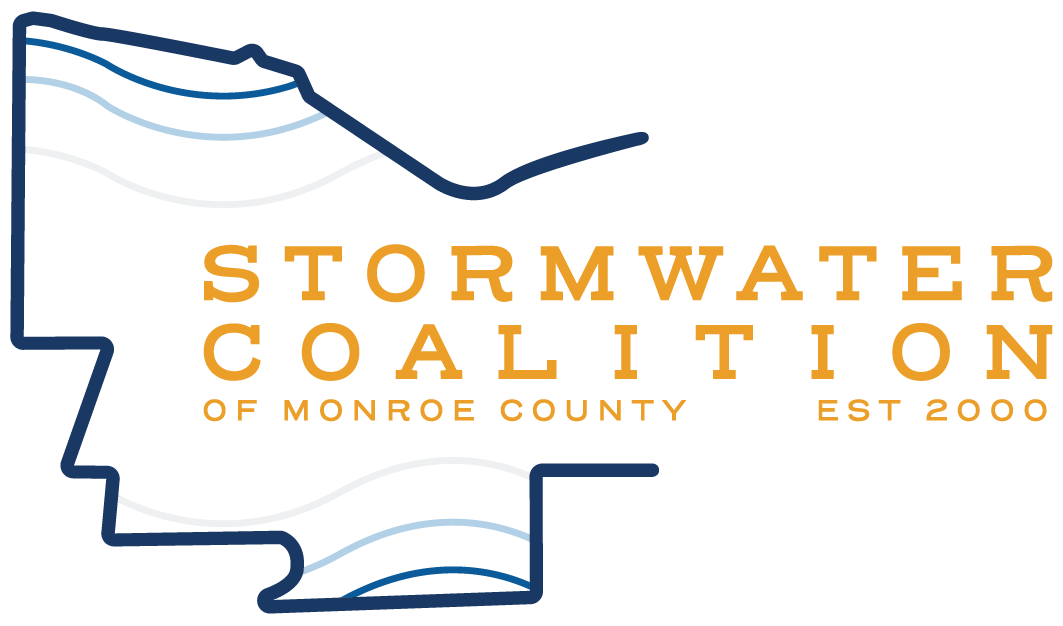Stormwater Coalition
of Monroe County
Established in 2000, the Monroe County Stormwater Coalition is composed of 29 municipal members.
The Coalition meets monthly and leadership is provided by a Chairman, Vice-Chairman, and Executive Committee. Staff from the Monroe County Department of Environmental Services coordinate and support Coalition programs. The work of the Coalition is advanced by several task groups including Education, Construction, and Illicit Discharges/Pollution Prevention.
The Coalition implements a wide range of projects and programs including public education, training for municipal employees and the land development community, demonstrations of practices that reduce polluted runoff from developed land, technical assistance with permits and erosion control, investigations of stormwater outfalls for indicators of illegal discharges, assessments of municipal facilities for opportunities to prevent pollution.
The Coalition has developed partnerships with several organizations in order to utilize existing expertise and maximize its efforts. Partners include the Monroe County Soil & Water Conservation District, the Water Education Collaborative (WEC), Rochester Museum & Science Center, and Seneca Park Zoo.
Photo of the Genesee River, City of Rochester.
Managing Stormwater
Stormwater Pollution
Stormwater pollution is the sediment, bacteria, fertilizers, pesticides, automotive fluids, and other materials that are washed from surfaces such as parking lots, roads, roofs, and construction sites during a rain storm or snow melt. The gutters, storm drains, pipes, ditches, and outfalls that comprise the stormwater system transport these pollutants to the nearest waterway. In most cases, stormwater runoff is not treated at a wastewater treatment plant.
Map of Monroe County’s watershed.
Monroe County’s Stormwater
Managing the rainwater that runs off land surfaces during storms is one of many challenges facing urban areas like Monroe County. Historically, the primary goal in dealing with stormwater runoff was to prevent immediate threats to life and property due to flooding, followed closely by a desire to keep streets safe and passable at all times. In recent decades, it has become clear that to create a sustainable community, local stormwater runoff must also be managed to address the serious adverse impacts that increased nutrients, sediment, and other pollutants carried by this runoff are having on our local streams, Irondequoit Bay, and ultimately on the health of Lake Ontario.
This is a transformational time for stormwater management, as Monroe County begins to implement more holistic stormwater management practices that go beyond traditional urban stormwater drainage systems of the past to address multiple stormwater management objectives that include reducing flood risks, improving stream ecology, and complying with stringent regulatory requirements.
Our Program Requirements
Public Education & Outreach
This includes the distribution of educational materials and outreach activities that inform the public about the impacts of polluted stormwater runoff can have on water quality.
Public Participation & Involvement
Provide opportunities for citizens to participate in the development, implementation, review and revision of the stormwater management program. This includes publicizing public hearings and encouraging citizens participate in the stormwater management program process.
Illicit Discharge Detection & Elimination
Develop, implement and enforce a plan to detect and eliminate illicit discharges. This includes developing and maintaining a map of outfall locations and their receiving waterbodies, mapping the storm sewershed, prohibit illicit discharges through laws or ordinances, and inform the public about the hazards associated with illegal discharges and the improper disposal of waste.
Construction Site Runoff Control
Develop, implement and enforce an erosion and sediment control program for construction activities that disturb greater than or equal to one acre of land.
Post-Construction Runoff Control
Develop, implement and enforce a plan that addresses stormwater runoff from new development and redevelopment projects and incorporates enforceable mechanisms. Applicable controls could include preventative actions (e.g., protecting sensitive areas) or the use of structural controls (e.g., grassed swales or porous pavement).
Pollution Prevention/Good Housekeeping
Develop and implement a program to prevent or reduce pollutant runoff from municipal operations. The program must include municipal staff training on pollution prevention measures and activities to reduce the amount of pollutants in stormwater (e.g., regular street sweeping, reduce the use of pesticides or street salt, or frequent cleaning of catch-basins).


